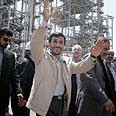
Iran complains to UN about Israeli 'threats'
Tehran's envoy says Jerusalem's 'unlawful' threats to strike nuclear facilities 'display aggressive and warmongering nature of the Zionist regime'; White House denies report it will scrap demand that Iran cease enriching uranium at start of nuclear talks
Iran demanded on Tuesday that the UN Security Council respond firmly to what it described as Israel's "unlawful and insolent threats" to launch an attack on Iran's nuclear facilities.
Israeli officials, including Prime Minister Benjamin Netanyahu and President Shimon Peres, have suggested the Jewish state could use military force to prevent Tehran from developing nuclear weapons, as the West suspects it is doing.
Iran insists it is only interested in building reactors that peacefully generate electricity. Iranian President Mahmoud Ahmadinejad, who has said Israel should be "wiped off the map," has vowed to continue his country's nuclear program.
Iran's UN ambassador, in a letter to Mexican UN Ambassador Claude Heller, said Israel was violating the UN charter and urged the international body to respond clearly and resolutely. Mexico holds the rotating presidency of the Security Council.
"These outrageous threats of resorting to criminal and terrorist acts against a sovereign country and a member of the United Nations not only display the aggressive and warmongering nature of the Zionist regime, but also constitute blatant violations of international law," Iranian Ambassador Mohammad Khazaee wrote.
The letter came two days after Peres told Israel's Kol Hai radio that Israel would respond with force if US offers of dialogue failed to persuade Ahmadinejad to halt Tehran's uranium enrichment program.
"We'll strike him," Peres said in the interview.
Netanyahu and several of his military aides made clear in an interview with Atlantic magazine last month that the government was weighing the military option in dealing with Iran's nuclear ambitions.
Khazaee said the remarks were "unlawful and insolent threats" based on "fabricated pretexts."
Marco Morales, spokesman for Mexico's UN mission, confirmed receipt of the letter. He said Mexico circulated it to the rest of the council and would only take the issue further if council member states asked to do so.
Also on Tuesday, the White House said a report that Washington could scrap its demand that Iran cease enriching uranium at the start of talks on its nuclear program was not accurate.
The New York Times reported that US and European diplomats have considered allowing Iran to continue enriching uranium for some period while talks get off the ground, which would mark a sharp shift in policy.
"This would not be the first time that I have stood at this podium, having read something in the newspaper that I found to be not accurate," White House spokesman Robert Gibbs said.
'Obama will have no choice'
State Department spokesman Robert Wood also denied the New York Times report.
The administration of former president George W. Bush had insisted that Iran mothball its enrichment program before talks begin, amid fears that the activities may be part of a nuclear weapons program.
Tehran had rejected that proposal, arguing that it had a legitimate right to run a civil nuclear program -- including the enrichment of uranium -- under international law.
"We have all agreed that is simply not going to work -- experience tells us the Iranians are not going to buy it," the Times quoted a European diplomat as saying.
If approved, the shift in tactics would likely provoke outcry in Israel, which says Iran is trying to prevaricate while it continues to build a nuclear weapon.
Enriching uranium so that it can be used for nuclear power -- or building a weapon of mass destruction -- lies at the heart of the controversy surrounding Iran's nuclear program.
The permanent five members of the UN Security Council - the United States, Britain, France, China and Russia - plus Germany have long offered Iran trade, financial and other incentives in return for halting its uranium enrichment program.
But so far Tehran has refused, leaving diplomatic efforts deadlocked.
Iran said on Monday it would welcome constructive dialogue on its nuclear program with the five permanent Security Council members.
The council has adopted five resolutions demanding that Iran freeze its uranium enrichment program, three of which imposed sanctions against Tehran. Iran has so far refused to stop enriching uranium.
US President Barack Obama has promised to pursue a policy of engagement with Iran in an attempt to persuade Tehran to suspend its enrichment program.
US officials, diplomats and analysts say Obama opposes the use of military force against Iran's nuclear sites but is worried that Israel, which bombed Iraq's nuclear reactor at Osiraq in 1981, might bomb Iranian sites if engagement fails.
If Tehran continues to enrich uranium, analysts say, Obama will have no choice but to support a push for a new round of UN sanctions against the Islamic Republic later this year.










